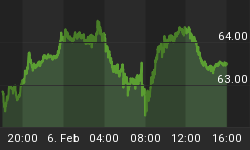"The stock market" is struggling, with particular weakness in the NASDAQ.




Tech stocks are tentatively topping. We doubt a significant stock market advance without tech.


Surging energy prices and stocks may be good for investors, but the broad implications are negative.


Short-term interest rates are being driven higher by the Fed. At some point, they will bite.


Bond prices are topping out, and bond yields are rising. Another negative.


Mortgage rates are critical to housing, but adjustable rates and fixed rates are rising.


The dollar is in a downtrend (left chart), with critical support at 80 apparently to be tested (right chart).


A lower dollar is not in the interest of the U.S. because:
It will not alleviate the trade deficit, as many hope and expect.
It may cause foreign governments and investors to reduce capital investment in the U.S.
Reduced capital inflows diminish support of the dollar and U.S. financial markets
A falling dollar exacerbates financial market losses for foreign investors, triggering ...
Selling of U.S. financial assets and dollars, which feeds back to #4
Beware the Ides of March?















